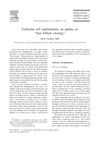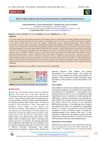 1 citations,
April 2023 in “Biomolecules”
1 citations,
April 2023 in “Biomolecules” Fermented papaya and mangosteen in hair care products helped prevent hair loss and improve hair thickness.
 15 citations,
March 1996 in “Journal of The American Academy of Dermatology”
15 citations,
March 1996 in “Journal of The American Academy of Dermatology” The book "Practical Contact Dermatitis" is useful for dermatologists but could be more user-friendly.
 2 citations,
March 1996 in “Journal of The American Academy of Dermatology”
2 citations,
March 1996 in “Journal of The American Academy of Dermatology” The book is an updated guide on hair transplant techniques, useful for beginners and professionals.
 1 citations,
June 2023 in “Journal of Cosmetic Dermatology”
1 citations,
June 2023 in “Journal of Cosmetic Dermatology” Exosome treatment for hair growth is promising but not FDA-approved and needs more research on safety and how it works.
 4 citations,
January 2018 in “Elsevier eBooks”
4 citations,
January 2018 in “Elsevier eBooks” Hormones are crucial for regulating body functions and imbalances can lead to health issues.

Ziziphus jujuba and Eclipta alba leaf extracts improve blood sugar levels and cognitive function in diabetic rats.
 5 citations,
April 2019 in “Phytochemical Analysis”
5 citations,
April 2019 in “Phytochemical Analysis” The new ELISA method is reliable and eco-friendly for checking the quality of Pueraria candollei.
 September 2023 in “Asian journal of beauty & cosmetology”
September 2023 in “Asian journal of beauty & cosmetology” Lipids are important for healthy hair, but their exact role is not fully understood and needs more research.
 19 citations,
September 1995 in “Food and nutrition bulletin”
19 citations,
September 1995 in “Food and nutrition bulletin” Leucaena leucocephala is nutritious but needs careful processing to remove toxins.
 3 citations,
October 2022 in “Frontiers in Surgery”
3 citations,
October 2022 in “Frontiers in Surgery” Proteomics combined with other technologies can lead to a better understanding of skin diseases.
April 2010 in “The journal of immunology/The Journal of immunology” FoxN1 gene is crucial for proper thymus structure and normal skin appearance.
 27 citations,
April 2020 in “Journal of Experimental Botany”
27 citations,
April 2020 in “Journal of Experimental Botany” Glutathione helps Arabidopsis roots adapt to low phosphate by regulating a specific growth pathway.
 11 citations,
August 2020 in “Dermatologic therapy”
11 citations,
August 2020 in “Dermatologic therapy” The document concludes that mesotherapy can be effective for skin and hair treatments, but more research is needed to confirm its safety and effectiveness.
 75 citations,
June 2019 in “International Journal of Molecular Sciences”
75 citations,
June 2019 in “International Journal of Molecular Sciences” Costunolide may have multiple health benefits, including promoting hair growth and protecting against cancer and diabetes, but more research is needed.
 10 citations,
May 2019 in “BMC Complementary and Alternative Medicine”
10 citations,
May 2019 in “BMC Complementary and Alternative Medicine” The extract from Bacillus/Trapa japonica fruit helps increase hair growth and could be a potential treatment for hair loss.
 13 citations,
August 2019 in “Journal of Ethnopharmacology”
13 citations,
August 2019 in “Journal of Ethnopharmacology” Eleven traditional Polynesian plants show potential for natural anti-aging, hair growth, and skin brightening products.
 26 citations,
April 2019 in “Advances in wound care”
26 citations,
April 2019 in “Advances in wound care” Tannic acid helps wounds heal faster in rats by activating certain cell signals and reducing inflammation.
 18 citations,
November 2014 in “Journal of Agricultural and Food Chemistry”
18 citations,
November 2014 in “Journal of Agricultural and Food Chemistry” Brazilian propolis was found to speed up hair growth in mice by increasing the growth of skin cells that form hair.
 31 citations,
October 2017 in “Dermatologic Surgery”
31 citations,
October 2017 in “Dermatologic Surgery” Hair transplants look natural, but the best method is debated, and PRP shows promise for hair regrowth.
 5 citations,
January 2020 in “Current Pharmaceutical Design”
5 citations,
January 2020 in “Current Pharmaceutical Design” Geranium plants have healing properties like fighting microbes, protecting the liver, reducing inflammation, and may help with viruses, stomach issues, and diabetes.
1 citations,
May 2024 in “Pharmaceutics” Hemp is a promising ingredient for skin products due to its healing and soothing properties.
 2 citations,
July 2018 in “Elsevier eBooks”
2 citations,
July 2018 in “Elsevier eBooks” Some supplements may help with hair loss, but there's not enough strong evidence to recommend them without doctor advice.
 15 citations,
May 2004 in “Facial Plastic Surgery Clinics of North America”
15 citations,
May 2004 in “Facial Plastic Surgery Clinics of North America” The document concludes that while "hair follicle cloning" shows promise for unlimited donor hair, it faces challenges with consistency and safety in humans.
 August 2024 in “PLoS ONE”
August 2024 in “PLoS ONE” Younger Jordanians know more about rosemary, often using it for hair and stomach issues.
 September 2023 in “Food and chemical toxicology”
September 2023 in “Food and chemical toxicology” High doses of some selenium supplements caused liver and reproductive harm in rats.
January 2025 in “Microorganisms” Using Armillaria strain A541 boosts Polyporus umbellatus yield and polysaccharide content.
February 2024 in “IntechOpen eBooks” Proper nutrition can help manage PCOS symptoms and improve overall health.
 17 citations,
November 2000 in “Journal of the American Pharmaceutical Association”
17 citations,
November 2000 in “Journal of the American Pharmaceutical Association” The document concludes that low-dose oral contraceptives and hormonal therapies can manage perimenopause symptoms and reduce some health risks, but lifestyle changes and disease screening are also important.

Kerascalp hair serum was found to be safe and effective in improving hair growth and strength in people with mild to moderate hair loss.
 November 2022 in “International journal of pharmaceutical sciences review and research”
November 2022 in “International journal of pharmaceutical sciences review and research” Adding value and variety to herbal products helps promote them and can make India a leading exporter.

























